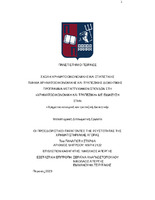Οι προσδιοριστικοί παράγοντες της ρευστότητας της χρηματιστηριακής αγοράς

View/
Keywords
Mέλη G7 ; Διαστάσεις ρευστότητας ; Μέτρα ρευστότητας ; Μεταβλητότητα ; Αναμενόμενη απόδοση ; Bid-Ask Spread ; Amihud Illiquidity ratio ; Relative quoted spread ; Προσδιοριστικοί (μακροοικονομικοί) παράγοντεςAbstract
This empirical analysis presents the determinants of stock market liquidity among the G7 countries as well as distortions that market volatility may bring about in the liquidity and expected performance of the respective national stock exchanges of the G7 countries (France, Germany, United States, United Kingdom, Japan, Italy, and Canada). According to Chiang and Zheng (2015), the G7 member countries have specificities compared to other countries, with the lack of liquidity at the global level not being a negative factor but rather acting positively especially for stocks with high trading volume, low price, and risk volatility of national stock market institutions. The measures of liquidity in the empirical analysis are as follows: Amihud Illiquidity Ratio, Bid-Ask Spread, Relative Quoted Spread. The determinants independent or explanatory factors included in the model will contribute to the identification and correlation of liquidity levels being the dependent variables. Through panel models and tests, conclusions will be drawn on the liquidity determinants, liquidity measures as indicators of liquidity and general financial liquidity of G7 member countries. The sample for the empirical analysis of the G7 countries covers the period of 2010-2021 of quarterly frequency. As independent variables eventually the unemployment rate, the Gross Domestic Product, Central Bank lending rates, the risk premium or market premium, the financial market volatility, the term spread or yield curve between ten-year and quarterly bonds and debt securities respectively will be used.


